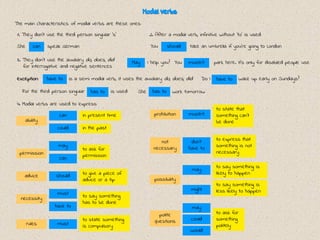
Modal verbs
- 1. The main characteristics of modal verbs are these ones: 1. They don’t use the third person singular ‘s’ She speak Germancan 2. After a modal verb, infinitive without ‘to’ is used 4. Modal verbs are used to express: ability can could in present time in the past permission may can to ask for permission advice should to give a piece of advice or a tip necessity must have to to say something has to be done rules must to state something is compulsory prohibition mustn’t to state that something can’t be done not necessary don’t have to to express that something is not necessary possibility may might to say something is likely to happen to say something is less likely to happen polite questions may could would to ask for something politely 3. They don’t use the auxiliary do, does, did for interrogative and negative sentences I help you?May You take an umbrella if you’re going to Londonshould You park here. It’s only for disabled people usemustn’t exception: have to is a semi modal verb, it uses the auxiliary do, does, did Do I wake up early on Sundays?have to For the third person singular is usedhas to She work tomorrowhas to
- 2. Examples: ability can could in present time in the past I can play the piano, but I can’t play the guitar I could count to 100 when I was 5 permission may can to ask for permission May/Can I use the phone? You may/can use the phone anytime (may sounds more polite than can) advice should to give a piece of advice or a tip You should do your homework every day necessity rules must have to to say something has to be done I must finish the project tonight (for myself, moral obligation) He has to finish the project tonight (for the rest of people, here you can use must too) must to state something is compulsory All drivers must have a driver’s license prohibition mustn’t to state that something can’t be done You mustn’t drive if you are drunk not necessary don’t have to to express that something is not necessary You don’t have to come to school next Saturday possibility may might to say something is likely to happen to say something is less likely to happen It may rain tomorrow (here can is used too) It might rain tomorrow polite questions may could would to ask for something politely May I borrow your pen? Could/Would you close the door, please?
